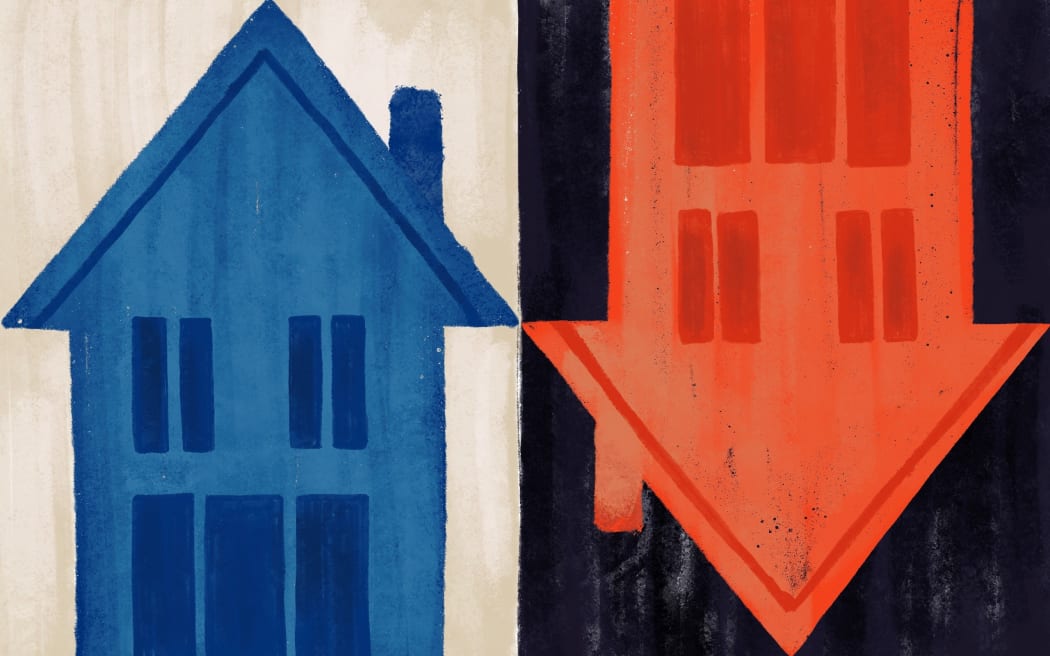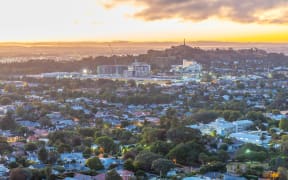
The national average house value fell 5.1 percent to $951,040 over the year earlier, QV data shows. Photo: RNZ
There has been a stark turnaround in the value of the house market over past year, with double-digit declines in value in all the main centres.
The latest QV House Price Index shows the average home decreased in value by 3.9 percent over the three months to the end of October, a smaller decline than the 5.4 percent quarterly drop reported at the end of September.
The national average house value fell 5.1 percent to $951,040 over the year earlier.
The index also showed a drop in average home values of 9.7 percent in the first 10 months of the year, compared with a 22 percent gain in the year-earlier period.
"I can't think of two more starkly contrasting consecutive years in my long career as a registered property valuer," QV chief operating officer David Nagel said.
Other research by property research firm CoreLogic indicated the drop in values was attracting first time buyers, with an increase in their share of buyers to 24 percent in the third quarter, compared with a long-term average of 22 percent.
Values were down in most parts of the country.
The list of towns, cities and regions with double digital declines in values was growing, with Wellington (-17.6 percent) topping a list of main centres, which included Auckland (-11.7 percent), Hamilton (-10.5 percent), Napier (-11.6 percent), Hastings (-11.5 percent), Palmerston North (-13.7 percent), and Dunedin (-10.4 percent).
The only exception was Queenstown, where home values increased 2.9 percent in the quarter, while New Plymouth was steady with a slight 0.1 percent drop.
All other main urban areas experienced declines of between 1.5 percent and 6.8 percent, with Wellington, Tauranga and Hastings posting the largest declines in the three months to the end of October.
Across the Auckland region, the average value now sits at $1,348,213, falling 4.4 percent this quarter, which was a slight improvement on the 5.8 percent rate of negative home value growth in the previous three-month period.
"The traditional spring upswing in the residential property market hasn't amounted to much more than a small speed bump this time around, with few pockets of true home value growth to speak of, and only a relatively small decline in the market's downward trajectory these past two months in a row," Nagel said.
"But we have certainly seen a seasonal surge in the number of properties coming on to the market, as spring is often seen as a good time to sell with longer days and summer looming large on the horizon.

Asking prices for houses have been dropping significantly each month Photo: RNZ / Angus Dreaver
"This has kept downward pressure on prices, especially as interest rates have also risen and are expected to climb further to stifle high inflation."
Nagel said the slowdown could continue as summer approaches, with an increasing volume of listings giving purchasers plenty of choice and the upper hand when it comes time to negotiate.
"This will likely continue to have a dampening effect on the market for a good while yet."
A slight slowing of the quarterly decline to a 3.9 percent fall in the three months to October indicated the market may be getting closer to bottoming out, but that was not likely until 2023.
"There's a whole lot more sellers than buyers, that's what's putting the downward pressure on prices," he told Morning Report. "I see that continuing right throughout summer."
The ongoing drop in values was making it cheaper for first home buyers to get a foot on the ladder, with a median price of $720,000 in the third quarter ended September, compared with $750,000 in Q2, and $759,000 in Q1.
"There was a noticeable lull in [first home buyer] market share during the first half of 2022, compared to the second half of 2021, when they represented one in four buyers," CoreLogic chief economist Kelvin Davidson said.
"To see them picking up market share closer to that figure again between July and September shows their resilience and determination to get into the market."




